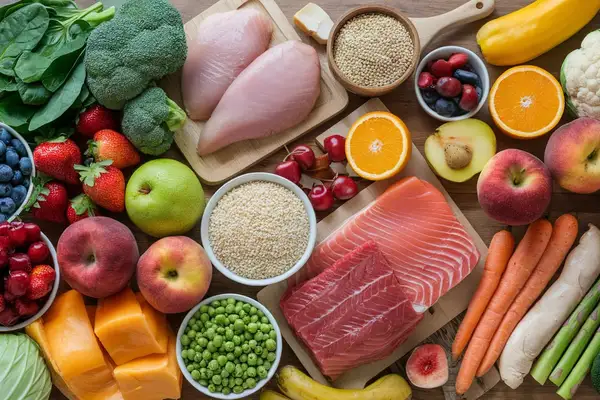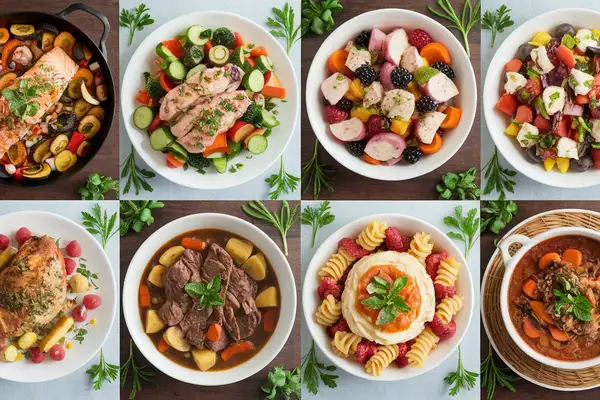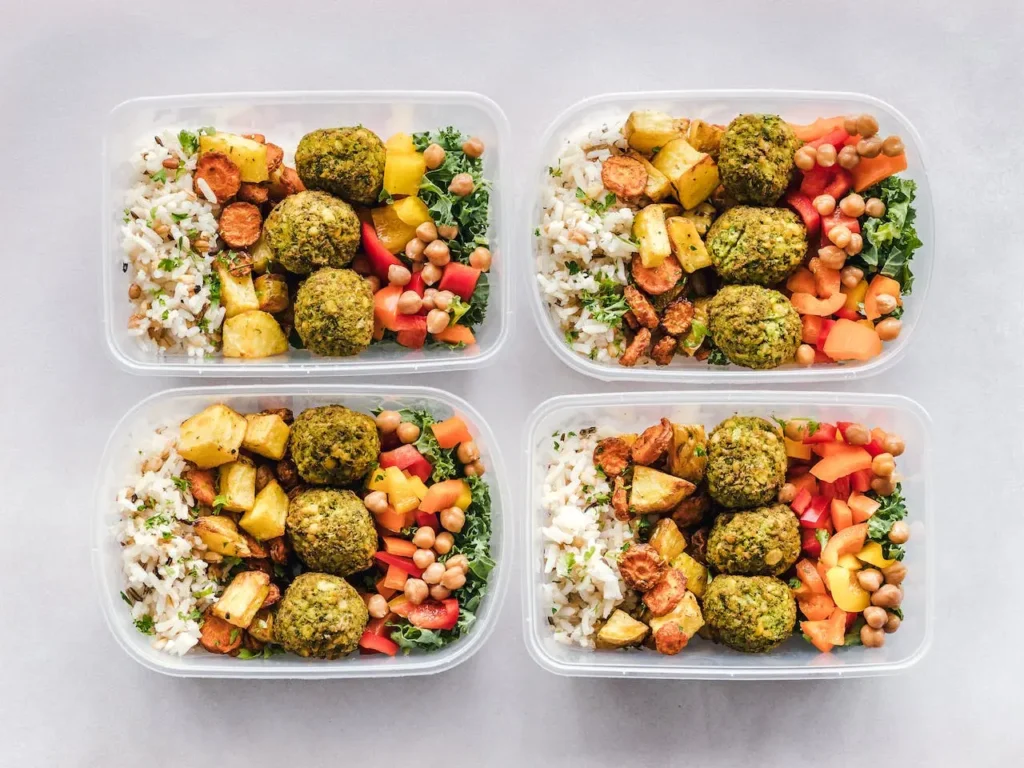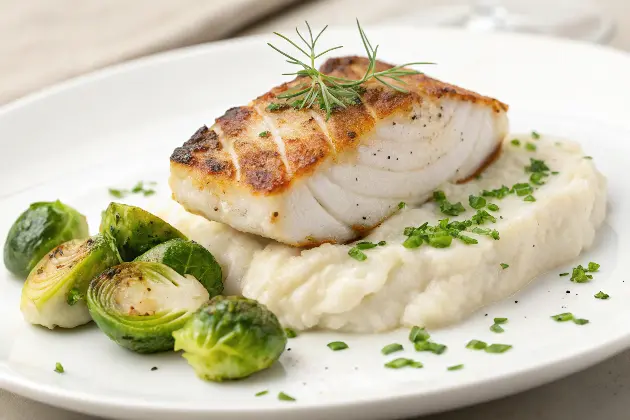Is Corn Good for Weight Loss? Discover 7 Ways It Helps

- The Nutritional Value of Corn for Weight Loss
- Is Corn Good for Weight Loss?
- How Does Corn Aid in Weight Loss?
- The Calorie Content of Corn
- Does Corn Contain Healthy Fats?
- Debunking the Myth About Corn for Weight Loss
- How to Incorporate Corn into a Weight Loss Diet
- Healthy Corn Recipes for Weight Loss
- How Long to Boil Corn on the Cob
- Conclusion: Is Corn Good for Weight Loss?
- FAQs
This post may contain affiliate links, meaning I may earn a commission if you make a purchase, at no extra cost to you. I only recommend products I trust. Thank you for your support.
In the quest for a balanced and healthy diet, many find themselves pondering, “Is corn good for weight loss?” or “Is boiled corn good for weight loss?”
Some believe that corn is a secret weapon for shedding those extra pounds, while others argue that it’s a high-calorie food best avoided.
Understanding the nutritional profile of corn for weight loss, including its glycemic index, carotenoid content, and the role of complex carbohydrates and corn oil, is crucial for discerning the effects of corn for weight loss.
In this article, we’ll dive deep into the nutritional intricacies of corn for weight loss, how long to boil corn on the cob, healthy corn recipes, and debunk common myths surrounding corn for weight loss.
The Nutritional Value of Corn for Weight Loss
Corn is a nutrient-dense food that offers a variety of health benefits:
- Carbohydrates: Corn is a rich source of carbohydrates, providing your body with a steady supply of energy.
- Fiber: One cup of corn contains approximately 4.6 grams of fiber, which can help promote feelings of fullness and support healthy digestion.
- Vitamins and Minerals: Corn is a good source of several essential vitamins and minerals, including vitamin C, vitamin B6, folate, and thiamine.
- Antioxidants: Corn contains various antioxidants, such as carotenoids and phenolic compounds, which can help protect your cells from damage.
- Protein: While not as high in protein as some other grains, corn still provides a decent amount, with around 5 grams per cup.
Is Corn Good for Weight Loss?
Yes, corn can aid in weight loss when consumed in moderation. It is low in calories and fat, and high in fiber and complex carbohydrates, which are digested and absorbed more slowly than simple sugars, helping to keep you full longer.
However the way corn is prepared and consumed can impact its weight loss impacts. For example, fried or creamy corn dishes may be high in calories and unhealthy fats, which could undermine its potential as a weight loss food.
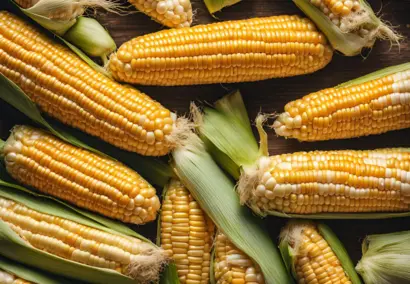
How Does Corn Aid in Weight Loss?
Incorporating corn into a balanced diet can be a healthy and satisfying way to support weight management goals.
Here’s how corn aids in weight loss:
1. Low in Calories
Corn is a relatively low calorie food, with one cup of cooked corn containing around 177 calories. This makes it a suitable option for those looking to manage their calorie intake and lose weight.
2. High in Fiber
The fiber in corn not only aids digestion but also plays a crucial role in satiety and portion control, essential elements in weight loss. Eating corn can help you feel fuller for a longer period, reducing the urge to eat more frequently.
3. Low in Fat
Corn is naturally low in fat, making it a good option for those looking to manage their weight. One cup of cooked yellow sweet corn contains 2.2 grams of total fat, which is considered relatively low.
4. Nutrient Dense
Corn contains various vitamins and minerals, providing essential nutrients while being relatively low in calories.
5. Energy Boost
The carbohydrates in corn can provide a sustained release of energy, potentially enhancing workout performance and overall physical activity.
6. Complex Carbohydrate
Corn is a complex carbohydrate, which means it is digested and absorbed more slowly than simple sugars. This can help prevent blood sugar spikes and crashes, which can contribute to cravings and overeating.
7. Low Glycemic Index
The glycemic index (GI) of fresh corn is low, ranging from 52 to 60 depending on the variety and preparation method. This means that corn is not likely to cause significant spikes in blood sugar levels.
The Calorie Content of Corn
Corn is generally considered a relatively low-calorie food, but it’s important to understand the calorie content in different forms.
It’s worth noting that the calorie content can vary depending on the specific preparation method and any additional ingredients added, such as butter, salt, or sauces.
Here is the calorie content of corn for weight loss:
- Cooked Corn on the Cob: One medium ear of cooked corn on the cob contains approximately 77 calories.
- Canned Corn: One cup of canned corn contains around 132 calories.
- Frozen Corn: One cup of frozen corn contains approximately 124 calories.
- Corn Flour: One cup of corn flour contains around 455 calories.
Does Corn Contain Healthy Fats?
Corn is not particularly high in fat, but the fat it does contain is generally considered healthy.
However, it’s important to note that the overall fat content in corn is relatively low, and it should not be relied upon as a primary source of healthy fats in your diet.
- Total Fat: One cup of cooked yellow sweet corn contains 2.2 grams of total fat, which is considered relatively low.
- Saturated Fat: It contains 0.3 grams of saturated fat, which is a small amount and falls within the recommended limits for a healthy diet.
- Trans Fat: High-quality and unprocessed corn does not contain any trans fat, which is a positive aspect for heart health and overall well-being.
- Monounsaturated Fat: It includes 0.5 grams of monounsaturated fat, which is a healthier type of fat known to have potential health benefits, particularly for heart health.
- Polyunsaturated Fat: With 0.9 grams of polyunsaturated fat, corn contributes to the overall intake of essential fatty acids, which play a crucial role in various bodily functions.
- Omega-6 Fatty Acids: Corn oil is rich in omega-6 fatty acids, particularly linoleic acid. It can contain anywhere from around 50% to 60% omega-6 fatty acids.
- Cholesterol-Free: Corn is a cholesterol-free food, making it a suitable option for those looking to manage their cholesterol levels.
Debunking the Myth About Corn for Weight Loss
There are several common myths and misconceptions about corn for weight loss. Let’s delve into some of these myths and provide clarifications regarding corn for weight loss:
1. Corn is Fattening
While corn does contain carbohydrates, it is not inherently fattening. It can be part of a healthy diet when consumed in appropriate portions.
The key is to be mindful of portion sizes and to prepare corn in a healthy manner, such as boiling or grilling, rather than frying or adding excessive amounts of butter or oil.
2. Corn is High in Sugar?
Corn does contain natural sugars, such as glucose and sucrose, but the overall sugar content is relatively low compared to many other fruits and vegetables.
3. Corn Doesn’t Have Nutritional Value
Corn is often perceived as lacking in nutritional value, but it actually contains essential nutrients such as fiber, vitamins, and minerals.
For example, it is a good source of vitamin C, thiamine, and folate. Additionally, corn contains antioxidants such as lutein and zeaxanthin, which are beneficial for eye health.
4. Corn is Not Suitable for Low-Carb Diets
While corn does contain carbohydrates, it can still be included in moderation in low-carb diets, especially if the overall carbohydrate intake is managed effectively.
Additionally, complex carbohydrates in corn have positive effects on digestion and satiety, which can be beneficial for individuals following a low-carb approach.
5. Eating Corn Leads to Weight Gain
Weight gain is not solely determined by the consumption of a single food item. Corn, when consumed as part of a balanced diet, can contribute to satiety and provide essential nutrients without causing weight gain on its own.
How to Incorporate Corn into a Weight Loss Diet
Incorporating corn into a weight loss meal plan can be a healthy and flavorful addition. Here are some tips on how to include corn in your diet while aiming to manage your weight effectively:
1. Mindful Portion Control:
When including corn in your meals, be mindful of portion sizes. A single serving of corn is about ½ cup of kernels, which contains approximately 15 grams of carbohydrates.
2. Balanced Meal Preparation:
Prepare corn in a healthy manner, such as grilling, boiling, or steaming, to minimize the need for added fats and oils. Avoid heavy butter or cream-based sauces, which can add excess calories.
3. Add to Salads:
Incorporate corn into salads to add natural sweetness and crunch. Combine it with leafy greens, lean protein, and a variety of colorful vegetables for a satisfying and nutritious meal.
4. Whole Grain Additions:
Mix whole kernel corn into whole grain dishes such as quinoa or brown rice for added texture and flavor. This combination provides a balance of fiber and nutrients.
5. Veggie Sauté:
Create a colorful and nutritious vegetable sauté by including corn along with other vegetables like bell peppers, zucchini, and tomatoes. This can be served as a side dish or as a topping for lean protein.
6. Snack Smart:
Enjoy air-popped popcorn as a satisfying and low-calorie snack option. Season it with herbs and spices instead of butter and salt for a healthier alternative.
7. Pair with Lean Protein:
Pair corn with lean protein sources such as grilled chicken, fish, or tofu to create a well-balanced meal that is satisfying and nutrient-dense.
8. Choose Whole, Unprocessed Corn:
When choosing corn for weight loss, opt for fresh, frozen, or canned corn without added sauces, butter, or other high-calorie ingredients.
Healthy Corn Recipes for Weight Loss
These recipes offer a variety of ways to incorporate corn into your diet while supporting your weight loss efforts.
By focusing on fresh and wholesome ingredients, you can enjoy the natural sweetness and nutritional benefits of corn in a healthful and delicious manner.
Here are a few recipes of corn for weight loss:
1. Corn and Black Bean Salad:
- Combine fresh corn kernels, black beans, diced bell peppers, cherry tomatoes, and red onions in a bowl.
- Dress with a light vinaigrette made from lime juice, olive oil, and a touch of honey.
- This colorful and fiber-rich salad makes a satisfying and nutritious meal or side dish.
2. Grilled Corn on the Cob with Chili-Lime Butter:
- Prepare fresh corn on the cob by grilling it until lightly charred.
- Create a flavorful and low-calorie spread by combining softened butter with chili powder, lime zest, and a pinch of salt.
- Spread the chili-lime butter over the grilled corn for a zesty and satisfying treat.
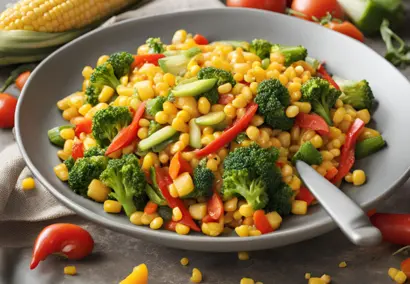
3. Corn and Vegetable Stir-Fry:
- In a non-stick pan, stir-fry fresh corn kernels with an assortment of colorful vegetables such as broccoli, snap peas, carrots, and bell peppers.
- Season with a light soy sauce or a touch of sesame oil for a healthy and filling dish.
4. Corn and Quinoa Stuffed Peppers:
- Prepare a filling by combining cooked quinoa, corn kernels, black beans, diced tomatoes, and a blend of spices.
- Stuff the mixture into halved bell peppers, sprinkle with a modest amount of cheese, and bake until the peppers are tender.
- This protein-rich dish is both satisfying and nutritious.
5. Corn and Chicken Lettuce Wraps:
- Sauté diced chicken breast with fresh corn, onions, and garlic.
- Season with a blend of cumin, paprika, and a touch of cayenne pepper.
- Serve the flavorful chicken and corn mixture in lettuce leaves for a light and refreshing meal.
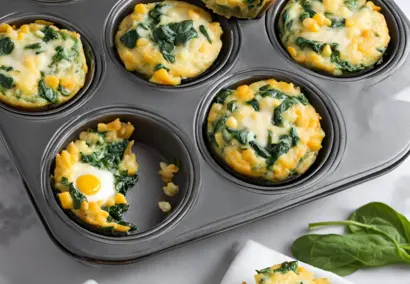
6. Corn and Spinach Egg Muffins:
- Whisk together eggs, fresh corn kernels, chopped spinach, and a sprinkle of feta cheese.
- Pour the mixture into muffin tins and bake until set.
- These portable and protein-packed egg muffins make a convenient and satisfying breakfast or snack option.
7. Homemade Fresh Corn Salsa:
- Combine diced fresh corn, tomatoes, red onions, jalapeños, cilantro, and a splash of lime juice to create a vibrant and flavorful salsa.
- Enjoy this low-calorie and nutrient-rich salsa as a topping for grilled fish, chicken, or as a dip for veggie sticks.
How Long to Boil Corn on the Cob
The ideal cooking time for boiling corn on the cob can vary, but here are some general guidelines:
- Fresh Corn: Boil fresh corn on the cob for 5-7 minutes, or until the kernels are tender but still crisp.
- Frozen Corn: Boil frozen corn on the cob for 7-9 minutes, or until the kernels are heated through and tender.
To boil corn on the cob, follow these simple steps:
- Prepare the Corn: Husk the corn and remove the silk. If desired, break or cut the ears of corn in half to fit into the pot more easily.
- Boiling Water: Fill a large pot with water, ensuring there’s enough water to cover the corn completely.
- Boiling Time: Boil the corn for about 5 to 9 minutes. The exact time will depend on the freshness and size of the corn.
- Check for Doneness: To check for doneness, insert a fork into a kernel. If it pierces easily, the corn is ready.
- Serve: Once the corn is done, remove it from the pot and let it cool slightly. Serve with your choice of seasoning or enjoy it as is.
Conclusion: Is Corn Good for Weight Loss?
In conclusion, is corn good for weight loss? While there are misconceptions surrounding corn for weight loss, it is important to approach its consumption within the context of a balanced and varied diet.
When prepared and consumed mindfully, corn for weight loss can be a nutritious and satisfying component of a healthy eating plan.
Corn is relatively low in calories and high in fiber but the way it’s prepared and consumed can impact its weight-loss benefits.
Remember, the key to incorporating corn into your diet effectively lies in moderation and opting for whole, minimally processed forms.
We hope this article has addressed your questions regarding, is corn good for weight loss, is corn healthy for weight loss, how long to boil corn on the cob, and corn for weight loss recipe tips.
- 6 week plan Ozempic weight loss results
- Green bananas for weight loss
- Food to avoid while taking Contrave
- 7-day high protein meal plan for weight loss
- How to lose belly fat quickly
- 7-day 1600 calorie meal plan for weight loss
- 20 meal prep ideas for weight loss
- 7-day PCOS diet plan to lose weight
- The menopause diet 5-day plan to lose weight
- Taylor Swift diet plan
- 7-day meal plan for cancer patients
- 7 foods to avoid with pituitary tumor
- 17 foods to avoid while breastfeeding
- How to make sea moss at home
- Does Ozempic have to be refrigerated?
FAQs
Why should I eat corn if it doesn’t fully digest?
Even though corn contains indigestible fiber, this fiber is crucial for other health benefits. It helps regulate bowel movements and manage blood sugar levels.
The presence of fiber, though it passes through the body undigested, plays a vital role in digestive health.
What nutrients does the body absorb from corn?
While the body cannot digest the cellulose in corn, which is a type of insoluble fiber, it can break down other components of corn.
Chewing corn thoroughly can help the digestive system break down the cellulose walls, allowing the body to access more nutrients from the corn.
Is corn considered an inflammatory food?
Corn itself is not typically inflammatory. However, processed corn products can contribute to inflammation. To reduce inflammation, it is recommended to avoid foods like refined sugar and processed corn.
Is boiled corn good for weight loss?
Yes boiled corn is good for weight loss. It is high in fiber, complex carbohydrates, and protein, providing a sense of fullness that can help reduce hunger and prevent overeating.
One small cup of fresh boiled corn contains 116 kcals, 15.8 grams of carbohydrates, 2.7 grams of fiber, and 2.2 grams of fats.
